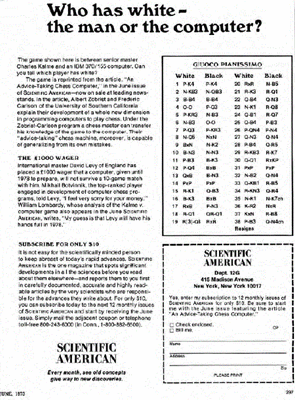An 'Advice-taking' Chess Machine
While working on the recent post, May 1973 & 1998 'On the Cover' (May 2023), I discovered a full-page ad for Scientific American in the May 1973 issue of Chess Life & Review. The ad is pictured below.

'Who has white - the man or the computer?'
The first paragraphs promoted an article on computer chess.
The game shown here is between senior master Charles Kalme and an IBM 370/155 computer. Can you tell which player has white?
The game is reprinted from the article, "An Advice-Taking Chess Computer," in the June issue of SCIENTIFIC AMERICAN -- now on sale at leading newsstands. In the article, Albert Zobrist and Frederic Carlson of the University of Southern California explain their development of a whole new dimension in programming computers to play chess. Under the Zobrist - Carlson program a chess master can transfer his knowledge of the game to the computer. Their "advice-taking" chess machine, moreover, is capable of generalizing from its own mistakes.
That 'a chess master can transfer his knowledge of the game to the computer' isn't as surprising in 2023 as it must have been in 1973. These days the problem is the opposite -- AI engines have trouble transfering their knowledge of the game to a human master. That a 'chess machine is capable of generalizing from its own mistakes' sounds like a stretch back in 1973.
The next paragraph was a summary of the Levy wager. It's worth remembering that the 1973 interest in chess computers was taking place during the chess boom following the 1972 Fischer - Spassky match.
THE £1000 WAGER • International master David Levy of England has placed a £1000 wager that a computer, given until 1978. to prepare, will not survive a 10-game match with him. Mikhail Botvinnik, the top-ranked player engaged in development of computer chess programs, told Levy, "I feel very sorry for your money." William Lombardy, whose analysis of the Kalme v. computer game also appears in the June SCIENTIFIC AMERICAN, writes, "My guess is that Levy will have his hands full in 1978."
I've already mentioned the SciAm article in a previous post: Scientific American's Computer Chess (January 2010):-
1973: A.L. Zobrist and F.R. Carlson, Jr.; 'An Advice-Taking Chess Computer'; Scientific American, Vol.228 no.6 (June 1973); p.92-105
Back to the question, 'Can you tell which player has white?' The game isn't available on The chess games of Charles Kalme (chessgames.com), so I entered it myself:-
[Event "Charles Kalme vs. IBM 370/155 computer; Who plays White?"]
[Site "Scientific American, June 1973"]
[Date "????.??.??"]
[Round "?"]
[White "?"]
[Black "?"]
[Result "0-1"]
1.e4 e5 2.Nf3 Nc6 3.Bc4 Bc5 4.O-O d6 5.h3 Nf6 6.Nc3 O-O 7.d3 h6 8.Nd5 Nxd5 9.Bxd5 Ne7 10.Bb3 Ng6 11.c3 Be6 12.d4 Bxb3 13.Qxb3 Bb6 14.dxe5 dxe5 15.Re1 Qf6 16.Be3 Bxe3 17.Rxe3 b6 18.Rd1 Rad8 19.Red3 Rxd3 20.Rxd3 Nf4 21.Re3 Rd8 22.Qc4 Qg6 23.Ne1 Rd1 24.Qf1 Rd2 25.Qc4 c6 26.b4 b5 27.Qb3 Qg5 28.c4 Qh4 29.Rf3 Re2 30.Qd1 Rxe4 31.cxb5 cxb5 32.Nc2 Qg5 33.Qf1 Rc4 34.Rg3 Qh5 35.Ne1 Ne2+ 36.Kh2 Nxg3 37.Kxg3 Rc1 38.f3 Qg5+ 0-1
A comment on the Chessgames.com page informs,
Dec-01-14 Petrosianic: I submitted a very odd Kalme game to the database once, but they never added it. It was from an advert for chess computers from the early 70's. The ad had a full game score between Kalme and a computer, but they didn't tell you who was who, and asked you to guess. I figured obviously Kalme was on the winning side (because if the computer had beaten him, they'd REALLY have bragged about that), and submitted the game. But it's not here.
I imagine Chessgames.com has a policy against having computer games on their database. As for the Levy wager, see Levy's Bet | Mastering the Game (computerhistory.org).




No comments:
Post a Comment